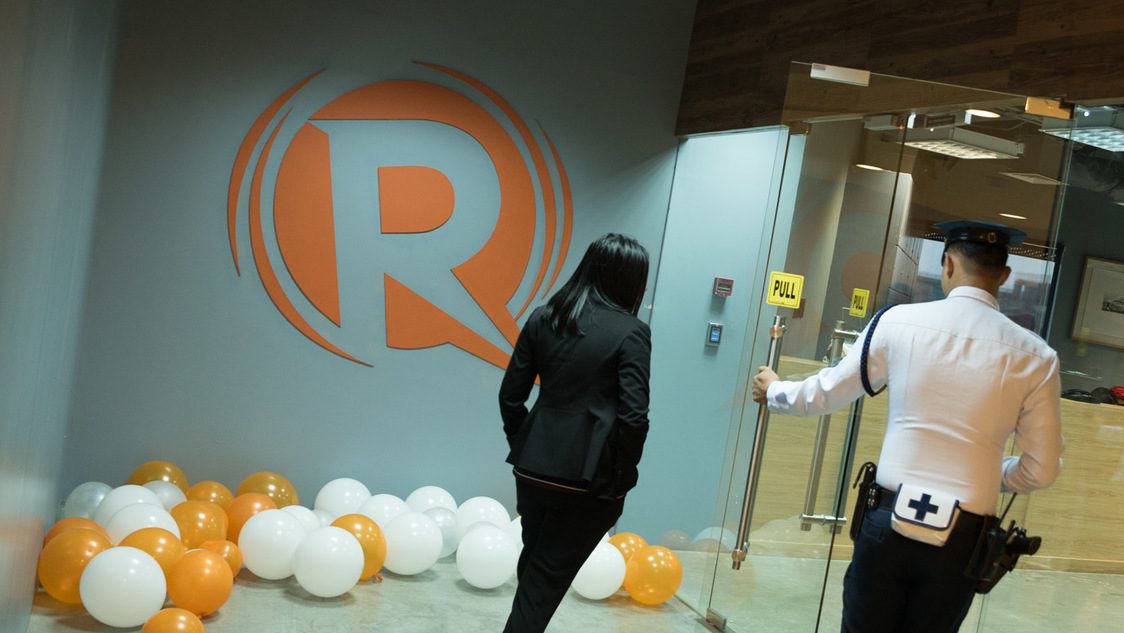SUMMARY
This is AI generated summarization, which may have errors. For context, always refer to the full article.

MANILA, Philippines – After a court-ordered review, the Securities and Exchange Commission (SEC) is standing by its original ruling in January 2018 to revoke Rappler’s certificates of incorporation.
This was according to Rappler’s lawyer Francis Lim, who was asked during a press conference on Monday, November 22, about the status of the SEC case that was elevated to the Court of Appeals (CA).
A February 10, 2021 report from the SEC to the Court of Appeals contained its ruling. Lim said a motion for reconsideration was filed and is still pending with the SEC.
“We also view it as a continuation of the previous proceedings, in which case we will have the same argument. So either or, it’s good for Rappler and Maria because it gives us the opportunity, it buys us more time to really ventilate the issue to the fullest extent possible,” said Lim on Monday during a press conference by Rappler CEO Maria Ressa and her international and local lawyers ahead of the December 10 Nobel Peace Prize awarding ceremony in Oslo.
The 13-page decision of a SEC special panel, which was forwarded to the CA on February 10, 2021, by Solicitor General Jose Calida, read: “The SEC Special Panel finds that the Donation did not cure the violation by Rappler and RHC of Article XVI Section 11(1) of the Constitution and PD 1080, and hereby affirms the administrative penalties imposed in the Decision dated 11 January 2018 declaring void the ON PDRs (Omidyar Network Philippine Depositary Receipts) pursuant to Section 71.2 of the SRC (Securities and Regulation Code) and revoking the Certificates of Incorporation of Petitioners Rappler, Inc. and Rappler Holdings Corporation.”
It was signed on December 14, 2020 by General Counsel Romuald Padilla, General Accountant Emmanuel Artiza, Company Registration and Monitoring Department Director Gerardo del Rosario, Markets and Securities Regulation Department Director Vicente Graciano Felizmenio Jr., and Enforcement and Investor Protection Department Officer-In-Charge Oliver Leonardo.
Rappler got breathing space on July 18, 2018 when the CA remanded the case to the SEC, and noted that the move of Omidyar to donate the Philippine Depositary Receipts (PDRs) to Rappler’s Filipino managers may have already cured the problem.
In that decision, the CA told the SEC to review its revocation of Rappler’s registration. They stood by their earlier findings.
Will it be immediately executory this time? Evidently not, because the CA received the SEC’s report way back in February and Rappler has continued to operate to date.
“That itself is an issue, it depends on how the Court of Appeals views the SEC decision upholding the revocation, whether it’s already final and therefore cannot be revisited by the same division of the Court of Appeals. It’s good for us, it gives us the opportunity to debate or litigate the effect of donation of PDRs to Filipinos,” Lim said on Monday.
Donation does not matter to SEC
The SEC for this review disagreed with the CA that Omidyar’s act of donating the contested PDRs to Rappler’s Filipino managers cured the defect.
“The Donation, just like the Waiver, was apparently an afterthought carefully calculated to ensure that Rappler, a violator of the constitution and statutes, is salvaged and allowed to carry out operations as a mass media entity,” said the SEC.
The SEC said the donation is void because the PDRs (the object of the donation) – “are void for being contrary to law.”
“Considering that the Donation is void for being contrary to law and public policy, the same cannot be ratified for the purpose of curing a violation made by Rappler against the Constitution and the laws,” said the SEC.
“In fact, no amount of effort can salvage the legal existence of Rappler and Rappler Holdings Corporation by virtue of the fact that the infirmity that tainted its Certificates of Incorporation is based on contracts that are void for violating the constitution and the laws,” said the SEC.
Lim said, “we made a very strong case there, and unfortunately the SEC panel did not ask for our view before submitting its report to the Court of Appeals.”
What the CA said
It was the CA that said in its July 18, 2018, decision that the donation seems to have “permanently removed” the problem.
“In view of the donation made by Omidyar of all the Omidyar PDRs to the Rappler staff, the negative foreign control found objectionable by the SEC appears to have been permanently removed,” the CA said in its decision. It then remanded the case to the SEC for review. (READ: FAQs: Rappler SEC case)
On the basis of Calida’s inquiry and six months after President Rodrigo Duterte, in his State of the Nation Address, falsely accused Rappler of being foreign-owned, the SEC revoked Rappler’s registration in January 2018, finding that the PDRs issued to foreign investor Omidyar allegedly violated the constitutional rule that media companies must be 100% Filipino-owned.
PDRs are legal financial instruments usually used by companies, including media entities, to attract foreign investments. Experts have noted that PDRs do not grant any kind of control and ownership to the holder.
Rappler has maintained that PDR holders did not have a say in the day-to-day operations of the company.
However, the SEC focused on a clause that required Rappler to engage Omidyar in a prior good faith discussion before it makes any changes in the company’s articles of incorporation. The SEC took that to mean it ceded some form of control to Omidyar, an interpretation that was vehemently denied and refuted by Rappler.
Rappler elevated the case to the Court of Appeals, and in July 2018, the appellate court remanded the case to the SEC for review. In March 2019, the CA stood by its earlier decision.
It was a nuanced CA decision, in which the justices denied Rappler’s petition after agreeing with the SEC that Omidyar’s PDRs are “tantamount to some foreign control.”
But the CA said Rappler is entitled to a corrective period where it can cure the defects that were found, as provided for in the Corporation Code. The CA then told the SEC the problem has been “permanently removed” by the donation.
The SEC disagreed, insisting in its review that “Rappler and RHC were engaged in an elaborate fraudulent scheme to effectively grant control and financial return to foreign investors in exchange for investments, thereby circumventing the constitutional prohibition on foreign equity in entities engaged in mass media.”
PDR issue
This mother case has given rise to a total of seven criminal charges against Rappler CEO Maria Ressa, and members of the 2016 board – 5 counts of failure to supply correct information in income tax returns (ITRs) and a consolidated case of violations of the anti-dummy law and the securities and regulations code (SRC). On top of these, Ressa was also criminally charged and convicted of cyber libel, a decision that is also under appeal.
Ressa is on trial for the 5 tax cases, 4 at the Court of Tax Appeals (CTA) and one at the Pasig Regional Trial Court (RTC).
The consolidated anti-dummy law and SRC cases have been remanded to Pasig prosecutors.
Media giant ABS-CBN had also been accused by Calida of violating the same constitutional prohibition because of its PDRs. No known case has been filed against ABS-CBN, although the House of Representatives killed its franchise.
ABS-CBN still has no franchise. President Rodrigo Duterte declared in February that he would not allow the National Telecommunications Commission to grant the network a permit to operate. House Speaker Lord Allan Velasco followed through, saying that such a franchise would have to wait until after Duterte’s term.
This evolving view on PDRs, according to experts, is having a negative effect on business in the Philippines, as it scares off investors and discourages them from using what had been recognized as regular financial instruments. – Rappler.com
Add a comment
How does this make you feel?














![[Just Saying] Ted Failon, press freedom, and the Supreme Court](https://www.rappler.com/tachyon/2024/07/20240709-ted-failon-press-freedom-supreme-court.jpg?resize=257%2C257&crop=296px%2C0px%2C720px%2C720px)






There are no comments yet. Add your comment to start the conversation.